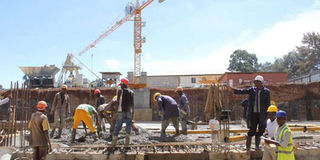Masons, carpenters relocate to Nairobi for higher wages

Construction of the Moi University Pension Scheme building in Eldoret town on May 20, 2014. Besides masons, other workers in the sector being lured to Nairobi are plumbers, electricians and painters. PHOTO | JARED NYATAYA | NATION MEDIA GROUP
What you need to know:
- Besides masons, other workers in the sector being lured to Nairobi are plumbers, electricians and painters.
- Mr Charles Mutua, a carpenter who until recently was based in Kitui in eastern Kenya, said the high number of houses being built in Nairobi makes the city the place to be for construction workers.
About six months ago Mr Maurice Eshitemi, a stone mason, left his home in Kakamega, western Kenya for the capital Nairobi to construct a block of apartments for a man who comes from the area.
“He was building rental units and wanted to work with someone he trusts. Since I had constructed his house in Kakamega, he was happy working with me in Nairobi,” said the builder last week.
With several other masons who were working under him, Mr Eshitemi completed the job over a month ago, but he is yet to return to Kakamega.
"I am not going to Kakamega anytime soon, Nairobi is where the real deal is. The payment is better and the job is regular. You cannot stay for a week without getting substantial work to do,” he said.
He is among hundreds of construction workers in Kenya who are being lured to Nairobi from upcountry in search of better earnings and regular work.
While the real estate sector in upcountry towns in Kenya is growing steadily, it is not as vibrant as that in Nairobi.
Besides masons, other workers in the sector being lured to Nairobi are plumbers, electricians and painters.
“In Kakamega, sometimes a month would end without me getting some work. Things had improved since a university was opened in the town and the county governments came into force, but they are not as good as in Nairobi,” he said.
IRRESISTIBLE REMUNERATION
In the capital, Mr Eshitemi who doubles up as a supervisor, earns up to $30 a day, a figure that is triple what he often earns in Kakamega.
“Life may be expensive in Nairobi as compared to rural Kenya, but if you earn more, why not work here, make a fortune and return home,” said Mr Eshitemi, who is currently working on a block of bungalows in the capital.
Mr Charles Mutua, a carpenter who until recently was based in Kitui in eastern Kenya, said the high number of houses being built in Nairobi makes the city the place to be for construction workers.
“In Kitui, the most one could get is fit cabinets, wardrobes or the ceiling in a single house. When the project ends, you have to wait for another. But in Nairobi, you are asked to fit wardrobes and drawers in a block of flat. It is substantial work that may take a month or two and comes with good money,” said Mr Mutua, who charges a minimum of $25 a day’s work and had to take some lessons on modern fittings.
To roof a house or put the ceiling, the carpenter charges up to $600 for a bungalow, money that he could only dream of while working in Kitui.





